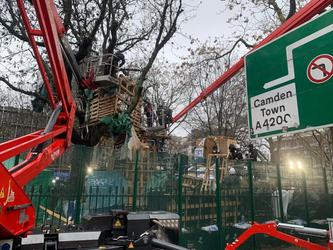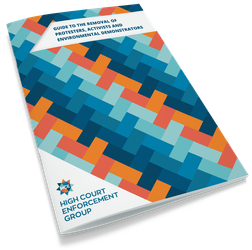Removing travellers during the pandemic
Legal perspective
From a legal point of view, there is no impediment to the removal of “persons unknown” from a site. The 120th practice direction update amends the Practice Direction 51Z issued on 27th March 2020 to allow possession proceedings against persons unknown.
Practical considerations
In our work over the last few months, we have identified a number of areas where traveller and protester removal has been impacted by the pandemic. In this article, we cover the key areas and provide practical advice for chief estates surveyors debating whether to proceed with eviction.
This advice covers: police support, writ or common law, notice period, false COVID claims, welfare checks, timescales, protective equipment and security measures.
Police support
Some police forces prefer to have travellers moved on due to increased crime and public order risks at a time when they are stretched by the pandemic.
We are finding that the police are more supportive of our work if a writ of possession has been issued. This is generally the case, but particularly so currently.
However, there are strong arguments in favour of a speedy removal, even during these times. In our experience, the longer a group of travellers is permitted to remain on the unauthorised site, the more likely it is that others will joining, making the removal an increasingly large task.
In terms of the return to school in September and access to medical facilities, the travellers may be better served by being on a more permanent official site, so moving them may be best for them, as well as the local authority and the community.
What is also working well is keeping communications open with the police force in each area we are operating, especially as each force has different approaches to dealing with the pandemic.
Writ or common law eviction
Traveller removal is most commonly undertaken under common law (Halsbury’s), however, during the pandemic, we would recommend obtaining a writ of possession. This will secure both support from the police, as well as formal authority for the council from the courts.
Notice period
During the pandemic, we recommend that a longer notice period than normal is given for traveller removal. This will give them time to find somewhere to move to, assuming the local authority is not offering them access to an official site.
False COVID claims
Human nature being what it is, it will probably come as no surprise that travellers and other trespassers are claiming to be self-isolating to prevent removal. Our response to this is that they can also self-isolate at their new location.
Welfare checks
We will undertake welfare checks and provide access to medical care or social services for those who need it, as well as check that there are bins and toilets available on site and that the occupiers have taken measures to prevent an outbreak.
Timescales
It is worth taking account of the fact that some contractors, for example, tow trucks, are operating reduced levels of service during the pandemic. This means that everything is taking a little longer than it normally would. The police may also require more notice than normal, given the increased calls on their resources.
In terms of obtaining a writ, we are finding that remote hearings are being set up quickly – sometimes the process is even faster than before COVID.
Protective equipment
Our enforcement agents already wear specific equipment – including body worn cameras, specialist clothing and helmets (where required) – but are now using more protective equipment relating to coronavirus for the safety of the people they are removing, the general public and themselves.
This includes masks, safety glasses, gloves and sanitisers. We have been spat at since the pandemic started on some of the protest sites we are working on, so this equipment is very necessary, as well as being required under Government guidelines.
Security measures
This final piece of advice is not specific to COVID but is relevant at all times. The best way to deal with travellers and other trespassers is to prevent their access to the site in the first place.
If they do gain access, the next step is to quickly secure the site to prevent others joining and then act quickly to remove them, whether under common law, a CPO warrant or a High Court writ of possession.
Further guidance
If you would like any advice or guidance about traveller removal during the pandemic, please do not hesitate to get in touch.
David Asker, HCEO
High Court Enforcement Group




